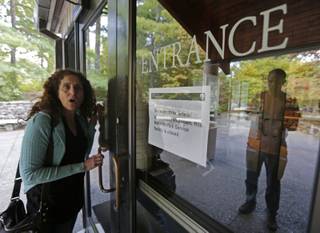
Richard Drew / AP
In this Wednesday, Oct. 2, 2013, file photo, trader Richard Scardino works on the floor of the New York Stock Exchange. Stock futures were falling sharply, Monday, Oct. 7, 2013, as the U.S. government headed into the second week of a partial shutdown with no signs of a budget agreement in sight.
Monday, Oct. 7, 2013 | 9:20 a.m.
NEW YORK — Investors kept their focus on Washington Monday, sending stocks lower as few signs emerged of a deal to end the U.S. government shutdown and raise the nation's borrowing limit.
Senate Democrats moved to introduce legislation to raise the nation's debt limit without the unrelated conditions Republicans have said they are seeking, officials said. The White House signaled it would accept even a brief extension in borrowing authority to prevent an unprecedented default by the United States.
On Sunday, speaker John Boehner had ruled out a vote in the House of Representatives on a straightforward bill to increase the government's borrowing without concessions from President Barack Obama.
Lawmakers have until Oct. 17 to reach a deal on increasing the nation's debt ceiling. Failure to strike a deal could cause the United States to miss payments on its debt. The Treasury warned last week that a default could push the economy into a downturn even worse than the Great Recession.
"Everything now is predicated on Washington," said Quincy Krosby, market strategist for Prudential. "That is what the market is focused on completely, getting a deal done to avoid a default."
The Dow Jones industrial average was down 95 points, or 0.6 percent, at 14,976 as of 1:40 p.m. Eastern time. The Standard & Poor's 500 index dropped nine points, or 0.5 percent, to 1,681. The Nasdaq composite fell 25 points, or 0.7 percent, to 3,782.
The losses were broad. Nine of the 10 industry groups in the S&P 500 dropped, led by makers of luxury consumer goods.
Until now, the stock market has mostly moved sideways since the shutdown began at the start of the month, indicating that investors still expect lawmakers to come up with a deal. The S&P 500 is flat in October.
In government bond trading, the yield on the 10-year Treasury note fell to 2.62 percent from 2.65 percent. The yield has fallen close to its lowest in two months. Investors have bought Treasurys on concern that U.S. economic growth will slow as the budget impasse drags on.
Some investors see the current stall in stock markets as a blip rather than a change in the long-term trend. The Federal Reserve continues to keep up its unprecedented stimulus of the economy, a strategy that has helped support a four-year surge in stocks.
The stock market climbed to record levels in September after the Fed said it would keep buying $85 billion of bonds a month to support the U.S. economy. Many investors had expected the central bank to start reducing its stimulus.
Minutes from the September meeting will be published Wednesday, giving investors an insight into the central bank's thinking.
"We would encourage investors with a long-time horizon to think of this as a buying opportunity," said Kristina Hooper, U.S. Head of Investment and Client Strategies at Allianz Global Investors. Many investors, who bought bonds after the financial crisis and the Great Recession, still hold too many bonds in their investment portfolios, she said.
Investors will also be keeping an eye on earnings reports this week.
Companies start releasing financial results for the third quarter. S&P 500 companies are projected to report slowing earnings growth for the fourth straight quarter, according to data from S&P Capital IQ.
The data company predicts that earnings from July to September rose 3.1 percent, compared with growth of 4.9 percent in the previous quarter.
In commodities trading, the price of oil dropped 76 cents, or 0.7 percent, to $103.04 a barrel as crude production in the Gulf of Mexico got back on track after a storm system passed through. The price of gold rose $15.20, or 1.2 percent, to $1,325.10 an ounce.
Among stocks making big moves:
— Cooper Tire & Rubber fell $3.71, or 12.6 percent, to $25.81 after the company filed a complaint in a Delaware court on Friday asking that the India company buying it quickly close on the deal. Investors are taking the news as a sign that the deal is in jeopardy.
— Mattel slipped $1.03 cents, or 2.4 percent, to $41.52 after a Goldman Sachs analyst cut his earnings estimates for the toy maker. The investment bank also cut its estimates for Hasbro, which fell 52 cents, or 1.1 percent, to $41.52. Goldman is predicting a tough holiday season for the toy makers as children favor video games.
— Apple rose $8.07, or 1.7 percent, to $491 after a Jefferies analyst raised his rating and price target on the stock, saying improving margins should help the business until the launch of the iPhone 6.


Join the Discussion:
Check this out for a full explanation of our conversion to the LiveFyre commenting system and instructions on how to sign up for an account.
Full comments policy